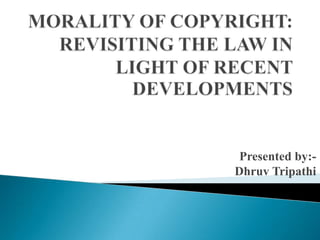
Morality of copyright revisiting the law in light of recent developments
- 2. The idea of moral rights originated in France. „Droit moral‟ or moral rights were an integral part of the ancient European tradition. First time recognized at an international platform at the Berne convention. Article 6bis of the convention stated: “independently of the author's economic rights, and even after the transfer of the said rights, the author shall have the right to claim authorship of the work and to object to any distortion, mutilation or other modification of, or other derogatory action in relation to, the said work, which would be prejudicial to his honor or reputation.”
- 3. Article 27 of Universal Declaration of Human Rights: “Everyone has the right to the protection of the moral and material interests resulting from any scientific, literary or artistic production of which he is the author.”
- 4. Section 57: 1) Independently of the author‟s copyright and even after the assignment either wholly or partially of the said copyright, the author of a work shall have the right- (a) To claim authorship of the work : and (b) To restrain or claim damages in respect of any distortion, mutilation, modification or other act in relation to the said work which is done before the expiration of the term of copyright if such distortion, mutilation, modification or other act would be prejudicial to his honor or reputation. Section 38 B
- 5. 1. Waiver of moral rights: Allowed???? Not explicitly stated anywhere unlike other jurisdictions. For eg; in US, Section 106 of VARA provides for waiver of moral rights if it is through a written contract. Scholars believe it is allowed if it is explicitly stated in a written contract. However, nothing in the language of Section 57 to suggest this.
- 6. 2. What constitutes “derogatory treatment of work”??? Two tests for determining derogatory treatment: Objective Test: Perception of the judge as to the effects of the said alteration or modifications on the reputation of the author. Subjective test: Author‟s own perception of the alteration and its impact on his reputation.
- 7. In India, legislative history suggests subjective test. for eg; in Amarnath Sehgal Case judges decided on basis of subjective test. Had it been objective test Sehgal wouldn‟t have got relief as he had not suffered any moral or other reputational harm as public couldn‟t see his work at all. Thus no clarity as to the position in India.
- 8. 3. Right against false attribution: Right to disclaim authorship not explicitly provided. In UK 4 moral rights provided, one of them being “ right against false attribution.” Similarly in US the right against misattribution recognized under the VARA and Lanham act, wherein if a work is attributed to an author against his/her will without his/her permission then it will amount to violation of the author‟s right of publicity. In Australia, Section 195 of the Copyright Act provides the right against false attribution.
- 9. In India, no such express provision is there. Action, if any, lies in law of torts under defamation. However right to sue for defamation does not lie after death of the author. Thus this should be provided for under Section 57 of Copyright Act.
- 10. 4. Duration of protection?? For authors, perpetual protection granted after 2012 amendment: legal representatives can claim right. No such similar protection for moral rights of performers: why??? In UK, under Section 205M of the Performances (Moral Rights etc) Regulation, 2006 moral rights can be exercised by the legal representatives of the performer. What would justify such discriminatory treatment between authors and performers???
- 11. 5. Scope of protection Whether parodies infringing moral rights of author?? OR Whether parodies should have independent moral right protection??
- 12. In Russia, special protection granted to creators of parodies provided their work does not violate the moral rights of the authors. In France, on the other hand, even the author of the parody enjoys exclusive moral rights. Indian Copyright Act, however is silent on the issue.
- 13. Moral rights granted to performers with 2012 amendment is a welcome change. However law vague, ambiguous and lacks clarity on critical points. Thus possibility of misuse by granting less or excessive protection Need of the hour is to make law clear and explicit on these points.
- 14. THANK YOU
